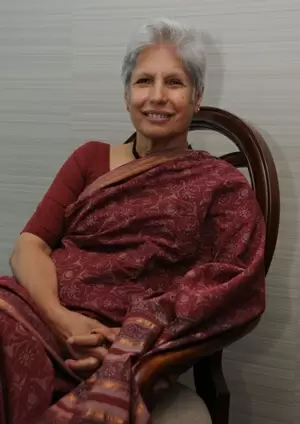Unless one taps the personal power within, one cannot lead: Anu Aga

31-August-2012
Vol 3 | Issue 35
Anu Aga took over the reins of the Thermax Group in 1996 after the death of her husband Rohinton Aga. Under her leadership, Thermax grew into a billion dollar company with global operations. A keen advocate of corporate social responsibility, she handed over the baton to her daughter Meher - who took over as Chairperson of Thermax Group in 2004 - and is now involved with the Thermax Social Initiative Foundation. Here’s her inspiring story, in her own words.
"From February 1996 to October 2004, I was the Chairperson of Thermax Limited. I had not envisaged myself in that role, nor was I groomed for a corporate career. With a Masters from the Tata Institute of Social Sciences, I had been trained as a social worker. Circumstances, however, brought me to the corporate world.
 |
|
Before the organisation could make radical changes, I had to change my own mindset: Anu Aga
|
Thermax was established over 40 years ago, jointly by my late father, A.S. Bhathena and my late husband Rohinton Aga, to manufacture boilers. Both my father and my husband were not engineers, and yet they built an engineering company. Under Rohinton, Thermax grew to become a well known engineering firm positioned in the crucial areas of energy and environment.
In 1996, a year after we went public, Rohinton suddenly passed away. Knowing that the market would be very concerned about succession, the Board within two days appointed our Executive Director as Managing Director and me as the Executive Chairperson. I had joined the company in 1985 and for five years preceding 1996, was heading the HR function.
As I struggled to deal with my husband’s death, I felt scared to assume this huge business responsibility for which I was not prepared. I kept telling myself that I had been selected because the family owned 62% of the company shares, and was troubled by feelings of self-doubt and inadequacy.
My second year in my new role was a few weeks old when, following my husband’s death, my twenty-five-year old son died in a car accident. It was a tough time and I found it difficult to cope with the inner turmoil. It did not help that this phase coincided with a downturn in the Indian economy, with our company’s performance deteriorating and share prices plummeting.
As I struggled with the turmoil, I realized I had a choice – either to feel helpless and wallow in self-pity, allowing my sense of inadequacy to grow, or to hold myself together and take charge of my life.
Vipassana, the Buddhist meditation, helped me to discover my inner strength and centeredness. On a retreat, ten days of solitude helped me to be in touch with my own self, gaining comfort and strength. I realized that all of us have to learn to deal with “loss” – loss of innocence, loss due to divorce, loss of dear ones etc.
It helped me to come to terms with what had happened. The meditation, which I have been practising ever since, also taught me that unless we tap the personal power which is within each of us, we cannot lead from positional power – the power that comes from our office and title.
Before the organisation could make radical changes, I had to change my own mindset. I had to clear mental cobwebs and confusions and move out of my comfort zone. It involved the objective evaluation of all our businesses and moving away from our attachment and sentimentality to businesses and people.
I realized that there were many things not going right for Thermax. The company had diversified into several unrelated, non-core areas and that was fragmenting our attention and resources. In the mistaken belief that Thermax would lose its employee oriented culture, we did not develop proper systems and processes.
We had got used to what Sumantra Ghoshal termed as “satisfactory underperformance.” I gave up my Executive position so that there was better clarity of authority, responsibility and accountability between the positions of the Chairperson and the Managing Director
It would take some more time and an operational loss for me to arrive at hard decisions to go for change at Thermax. But by then, the detachment that I gained in that difficult second year helped me realize that we were out of depth and needed external help. Contrary to what my colleagues in Thermax thought, I was convinced that we need to ask for help. We brought in a consultant and set in motion a series of changes.
We restructured our board, clearly differentiating the role of promoters, independent directors and professional management. We exited non-core businesses and decided to stick to the energy-environment space. Tougher and more painful was the challenge of asking some of our employees to leave, as we divested from some businesses and restructured others.
Eventually Thermax would turn around, thanks to the dedication of our senior team and the efforts of our employees, and grow to its present stature –a billion dollar company with global operations.
In 2004 October, I decided to step down and the Board appointed my daughter Meher, who is a Chemical Engineer, as Chairperson. Having gone through the trauma of taking charge of the company overnight, I was determined to ensure a planned and smooth succession.
The Thermax turnaround experience also led me to the most satisfying phase of my life which I am experiencing right now. Realizing that it is not enough for an organization to be profitable alone and that business cannot succeed in a society that fails, I decided to devote my life to the cause of education.
Through the Thermax Social Initiative Foundation, today I am committed to the work of making quality education available to the poorer section of our people. In the sense that I was trained for social work, my life has now come full circle."














